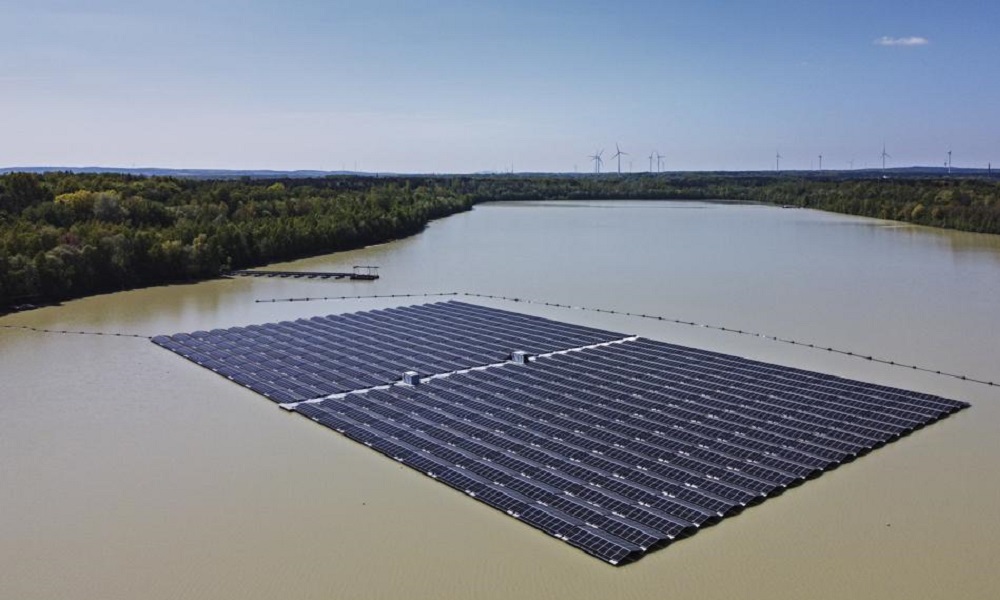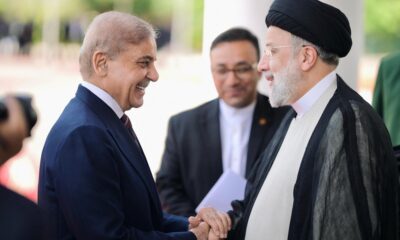Climate Change
Summer of ’22 brought record heat, solar power to Europe

Europe smashed previous temperature records this summer, with long periods of sunshine causing sweltering conditions and droughts across much of the continent but also helping boost much-needed solar power, according to data published Thursday.
The European Commission said average temperatures from June to August were 0.4 degrees Celsius (0.7 degrees Fahrenheit) higher on the continent this year than the previous record set in 2021. In August alone, the previous monthly record from 2018 was exceeded by 0.8 C (1.4 F) this year, it said.
“European temperatures were most above average in the east of the continent in August, but were still well above average in the southwest, where they had been high also in June and July,” the commission said, citing data gathered by its Copernicus climate program, which has used satellites to monitor surface air temperatures since 1991, AP reported.
Separately, energy think tank Ember said the European Union set a new record for solar power this summer, reducing the need for natural gas imports.
The group said the 27-nation bloc generated 12% of its electricity from solar power from May to August, up from 9% during the same period last year. Solar energy narrowly topped the share provided from wind or hydropower, while coming in just below that produced from burning coal.
Ember said that without the 99.4 terrawatt hours of electricity provided by solar, the EU would have had to buy 20 billion cubic meters of gas, costing about 29 billion euros (nearly $29 billion) during the four-month period.
The Netherlands and Germany, not known for their sunny climates, had the highest share of electricity from solar, followed by Spain. Poland saw the biggest increase in solar power generation compared with 2018, increasing installed capacity 26-fold, the report said.
“The solar records set this summer helped keep the lights on and reduced the EU’s now critical gas consumption, providing short-term relief to the soaring cost of energy,” its authors said.
With Europe trying to wean itself off Russian gas because of the war in Ukraine, and high fossil fuel prices expected to last for years, they urged governments to ensure that solar power use can expand further, including by removing regulatory hurdles.
The authors noted this would also help the EU achieve its climate goal, saying solar power — which provides much less electricity in the winter months — would need to increase up to nine-fold by 2035 for the bloc to meet the emissions targets set in the 2015 Paris accord.
Climate Change
Rescuers race to reach those trapped by floods in China’s Guangdong

WATCH: Rescuers on boats in China’s flood-ravaged Guangdong province raced to evacuate trapped residents, carrying some elderly people by piggyback from their homes and deploying helicopters to save villagers caught in rural landslides.
The southern Chinese province has been battered by unusually heavy, sustained and widespread rainfall since Thursday, with powerful storms ushering in an earlier-than-normal start to the region’s annual flooding season, Reuters reported.
Eleven people were missing in Guangdong by Monday morning, the state-owned Xinhua News Agency reported without giving further details.
Across the province, 53,741 people have been relocated, with 12,256 people being urgently resettled, Xinhua reported, citing the provincial government.
The cities of Shaoguan, Qingyuan, Zhaoqing and Jiangmen to the west and north of the provincial capital Guangzhou have been particularly hard hit.
In Qingyuan, houses and shops along the Bei River were submerged as the Pearl River tributary swelled, local media reported.
Aerial footage showed flood waters overwhelming a nearby town, leaving only roofs and treetops untouched.
Rescuers in Qingyuan tackled muddy waters, neck-high in some areas, to extract residents, including an elderly lady trapped in waist-deep water in an apartment building, videos on social media showed.
Other social media videos showed water gushing through roads and vehicles in disarray.
In Shaoguan, landslides trapped villagers who had to be rescued by helicopter while other rescuers traveled on foot to reach cut-off disaster sites, Reuters reported.
The Chinese military also stepped in to help clear roads.
The rains eased early on Monday, but some schools in the province were suspended.
Powerful thunderstorms are expected to return later in the week after a brief respite, marking an unusually early wet spell that is more typical in the months of May and June.
Climate Change
Massive river flooding expected in China, threatening millions

Major rivers, waterways and reservoirs in China’s Guangdong province are threatening to unleash dangerous floods, forcing the government on Sunday to enact emergency response plans to protect more than 127 million people.
Calling the situation “grim”, local weather officials said sections of rivers and tributaries at the Xijiang and Beijiang river basins are hitting water levels in a rare spike that only has a one-in-50 chance of happening in any given year, state broadcaster CCTV news said on Sunday.
China’s water resource ministry issued an emergency advisory, CCTV reported.
Guangdong officials urged departments in all localities and municipalities to begin emergency planning to avert natural disasters and promptly disperse disaster relief funds and materials to ensure affected people have food, clothing, water and a place to live, Reuters reported.
The province, a major exporter and one of China’s main commercial and trading centers, has seen torrid downpours for several days and strong winds due to severe convective weather, which has also affected other parts of China.
A 12-hour stretch of heavy rain, starting from 8 p.m. (1200 GMT) Saturday, battered the central and northern parts of the province in the cities of Zhaoqing, Shaoguan, Qingyuan and Jiangmen.
Almost 20,000 people have been evacuated in Qingyuan, according to state media, and some power facilities in Zhaoqing were damaged, cutting power to some places, Reuters reported.
Climate Change
UN sounds ‘Red Alert’ as world smashes heat records in 2023

Every major global climate record was broken last year and 2024 could be worse, the World Meteorological Organization (WMO) said on Tuesday, with its chief voicing particular concern about ocean heat and shrinking sea ice, Reuters reported.
The U.N. weather agency said in its annual State of the Global Climate report that average temperatures hit the highest level in 174 years of record-keeping by a clear margin, reaching 1.45 degrees Celsius above pre-industrial levels.
Ocean temperatures also reached the warmest in 65 years of data with over 90% of the seas having experienced heatwave conditions during the year, the WMO said, harming food systems.
“The WMO community is sounding the Red Alert to the world,” said WMO Secretary-General Celeste Saulo, who took over the job in January.
“What we witnessed in 2023, especially with the unprecedented ocean warmth, glacier retreat and Antarctic sea ice loss, is cause for particular concern.”
She later told reporters that ocean heat was particularly concerning because it was “almost irreversible”, possibly taking millennia to reverse.
“The trend is really very worrying and that is because of the characteristics of water that keep heat content for longer than the atmosphere,” she said.
Climate change, driven by the burning of fossil fuels, coupled with the emergence of the natural El Nino climate pattern, pushed the world into record territory in 2023, read the report.
WMO’s head of climate monitoring, Omar Baddour, told reporters there was a “high probability” that 2024 would set new heat records, saying that the year after an El Nino was typically warmer still.
Tuesday’s report showed a big plunge in Antarctic sea ice, with the peak level measured at 1 million km2 below the previous record – an area roughly equivalent to the size of Egypt.
That trend, combined with ocean warming which causes water to expand, has contributed to a more than doubling of the rate of sea-level rise over the past decade compared with the 1993-2002 period, it said.
Ocean heat was concentrated in the North Atlantic with temperatures an average 3 degrees Celsius above average in late 2023, the report said. Warmer ocean temperatures affect delicate marine ecosystems and many fish species have fled north from this area seeking cooler temperatures, Reuters reported.
Saulo, a meteorologist from Argentina who has promised to strengthen global warning systems for climate disasters, said she hoped the report would raise awareness of the “vital need to scale up the urgency and ambition of climate action”.
“That’s why we spoke about the Red Alert because we must care for the people and how they will suffer from these more frequent, more extreme events,” she told reporters. “If we do nothing, things will become worse and that will be our responsibility.”
-

 Latest News4 days ago
Latest News4 days agoPakistan’s frontiers minister stresses ‘dignified’ return of Afghan refugees
-

 Regional3 days ago
Regional3 days agoIranian president lands in Pakistan for three-day visit to mend ties
-

 Climate Change4 days ago
Climate Change4 days agoMassive river flooding expected in China, threatening millions
-

 Latest News4 days ago
Latest News4 days agoChinese keen to invest in Panjshir-Kabul water conduit project
-

 Latest News2 days ago
Latest News2 days agoRashid Khan named AWCC’s brand ambassador
-

 World4 days ago
World4 days agoTwo Japan navy helicopters crash, one body found, 7 missing
-

 Sport3 days ago
Sport3 days agoKolkata beat Bengaluru by one run in IPL as Kohli fumes at dismissal
-

 Sport3 days ago
Sport3 days agoACL: Aino Mina 3-0 Istiqlal Kabul; Attack Energy 3-0 Khadim


























